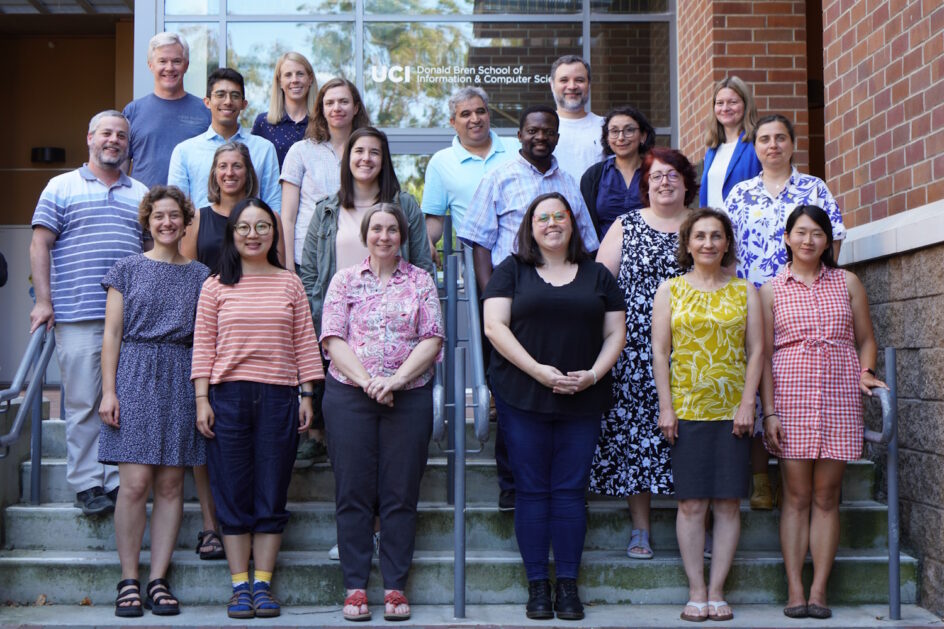Summer School for STEM Faculty: A Boot Camp in Bayesian Thinking
On July 10, 2023, 17 instructors from all around the country arrived at UC Irvine for a weeklong boot camp aimed at advancing Bayesian Thinking in STEM (BATS). Nancy Elizabeth Wentzel of Tennessee, an assistant math professor at Northeast State Community College, was among the BATS attendees.
“I’ve told my students before that the computational power we have now [has] revolutionized the way we’re able to approach statistical problems,” says Wentzel, who teaches an introductory course in statistics. However, prior to attending the BATS boot camp, she had only a vague understanding of Bayesian statistics and the real-world problems it can address.
“Having almost no experience working with realistically large data sets, statistical modeling, programming, Bayesian inference or analysis of results, I’ve now seen examples of all of these and been able to follow along with the ‘big picture’ of what Bayesian methods look like in different contexts,” says Wentzel. “This will enable me to speak with more knowledge and conviction [about] the importance of Bayesian methods to accomplish incredibly meaningful, real-world progress on the problems that matter most to all of us in healthcare, technology and every other area of modern life.”

The Need for New Training
The wide range of applications for Bayesian statistics — from supply-chain management to climate change adaptation — was part of the motivation for creating the BATS program.
“There is such a need for this kind of training,” says Statistics Professor Mine Dogucu of UCI’s Donald Bren School of Information and Computer Sciences (ICS). Dogucu is leading the BATS program in collaboration with Jingchen (Monika) Hu of Vassar College and Amy Herring of Duke University. The program stems from a paper Dogucu and Hu wrote last year: “The Current State of Undergraduate Bayesian Education and Recommendations for the Future.”
As outlined in the paper, their review of 150 colleges across the U.S. revealed that only 46 offered a Bayesian course, and in all but four, it was an elective — not required — course. “UCI was one of only four that required the course [for its data science major],” says Dogucu.
Based on the findings — and with funding from a National Science Foundation (NSF) programaimed at improving undergraduate STEM education — Dogucu, Hu and Herring designed a program to broaden the reach of Bayesian learning through instructor training. “We have a lot of programs designed for students,” says Dogucu, “but there’s very, very few opportunities for faculty training after people get their Ph.D.”
Advancing Bayesian Thinking in STEM
BATS is a three-tiered program for training STEM instructors and for developing and disseminating learning materials that highlight the use of Bayesian methods in STEM fields. Program participants receive a stipend, helping cover their time and expenses.
Tier one of the program is the summer boot camp (offered at UCI this summer and on the East Coast at Vassar College in summer 2024). UCI’s boot camp attendees came from both two- and four-year institutions and from a variety of departments, including math, economics, biology and public policy. The weeklong program included daily lessons on Bayesian inference, computing and modeling, put together by Dogucu, Hu and Herring. ICS Ph.D. student Federica Zoe Riccialso supported the program as a graduate student researcher.
Tier two of the program will take place this fall, with 10 instructors selected from the boot camp to develop Bayesian teaching and learning materials using scientific data from their fields. Dogucu, Hu and Herring will mentor the instructors and help guide curriculum development.
Tier three will then involve having five of those 10 instructors showcase the materials at conferences and through open-access publications. “In tier one, they learn about basic statistics and in tier two, we want to see how this can directly impact student outcomes with new teaching materials,” explains Dogucu. “Then in tier three, we want this impact to reach a national audience, with published papers and presentations at conferences.”
The ultimate goal is to strengthen undergraduate-level statistics education for improved scientific outcomes. “Most importantly, there are two big paradigms to approaching statistics — frequentist, which comes with p values, and Bayesian,” says Dogucu. “Moving forward, it would be very good if instructors knew both of these methods well so that students in the future have a more well-rounded perspective in statistics.”
— Shani Murray